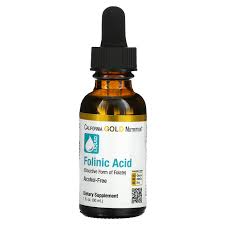Understanding Folinic Acid: Importance and Benefits

Introduction to Folinic Acid
Folinic acid, also known as leucovorin, is a form of folate, a B-vitamin crucial for numerous bodily functions. Its relevance has surged in recent years, particularly in the fields of oncology, medicine, and nutritional health. It serves as a rescue agent in patients undergoing specific types of chemotherapy, making it a vital component in cancer treatment protocols.
The Role of Folinic Acid in Health
Folinic acid plays a significant role in the synthesis of DNA, the production of red blood cells, and proper cellular division. It is also essential in preventing and treating folate deficiency, which can lead to conditions such as anaemia and complications during pregnancy. The bioavailability of folinic acid makes it an effective treatment option for patients who have impaired absorption of folate or who are unable to convert folic acid to its active form due to genetic mutations.
Current Research and Applications
Recent studies have highlighted the effectiveness of folinic acid in reducing the side effects of certain chemotherapy drugs like methotrexate, which can cause severe toxicity. For instance, a clinical trial published in the Journal of Clinical Oncology found that administering folinic acid significantly mitigated the toxic effects of high-dose methotrexate in cancer patients, leading to improved treatment adherence and outcomes.
Moreover, folinic acid is also being explored for its potential benefits in pain management and enhancing the efficacy of antidepressants. Research conducted on its neuroprotective properties, as well as its involvement in the methylation cycle, underscores its importance in mental health and cognitive functions.
Conclusion: The Future of Folinic Acid
The growing body of research indicates that folinic acid has multiple significant applications in both medical and nutritional settings. Its role in cancer treatment as well as potential therapeutic benefits in mental health confirm that folinic acid is a compound of considerable importance. As clinical understanding deepens, and more studies are conducted, it is likely that the applications of folinic acid will expand further, providing additional therapeutic avenues for patients suffering from a variety of health conditions.
For readers, understanding the importance of folinic acid can be vital not only for those undergoing medical treatment but also for anyone wishing to optimise their health through appropriate supplementation and dietary choices.
